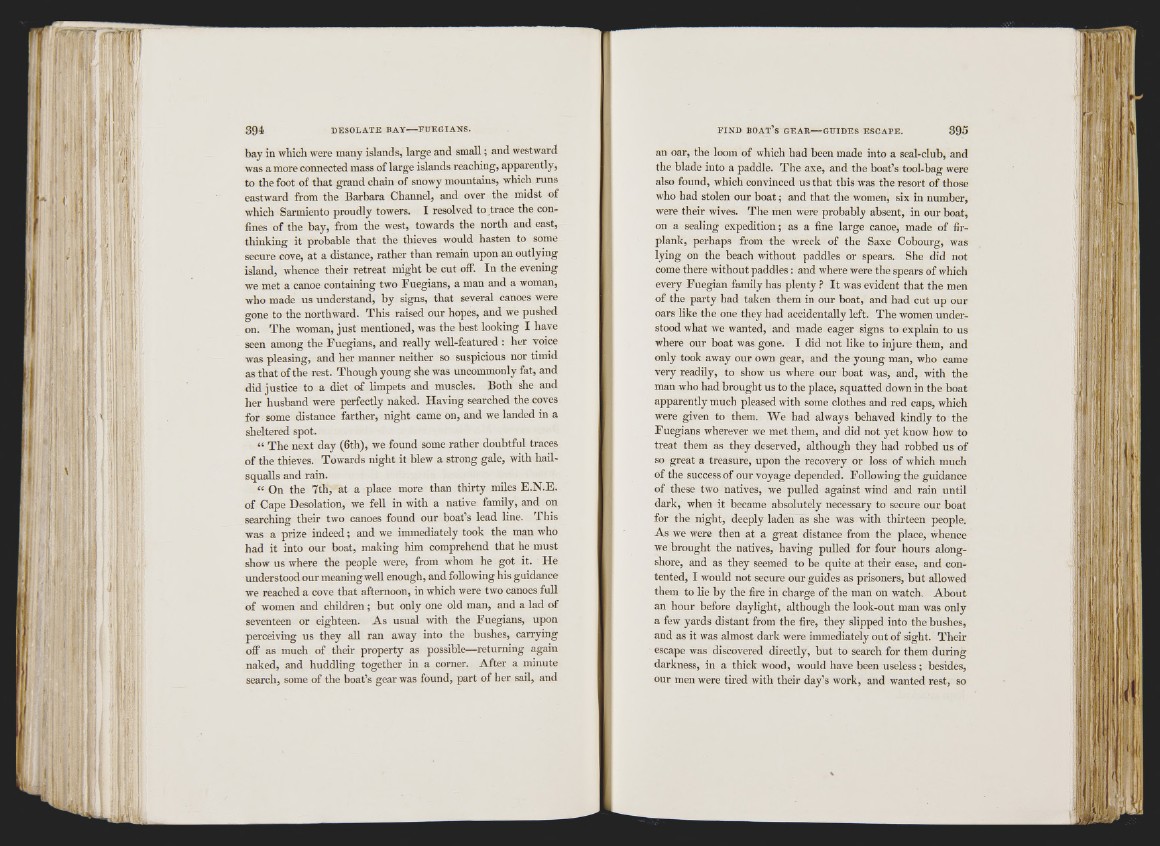
894 DE SOLAT E HAY FU EGIAN S .
' i 1
‘I to'
bay in which were many islands, large and small; and westward
was a more connected mass of large islands reaching, apparently,
to the foot of that grand chain of snowy mountains, which runs
eastward from the Barbara Channel, and over the midst of
which Sarmiento proudly towers. I resolved to trace the confines
of the bay, from the west, towards the north and east,
thinking it probable that the thieves would hasten to some
secure cove, at a distance, rather than remain upon an outlying
island, whence their retreat might be cut off. In the evening
we met a canoe containing two Fuegians, a man and a woman,
who made us understand, by signs, that several canoes were
gone to the northward. This raised our hopes, and we pushed
on. The woman, just mentioned, was the best looking I have
seen among the Fuegians, and really well-featured ; her voice
was pleasing, and her manner neither so suspicious nor timid
as that of the rest. Though young she was uncommonly fat, and
did justice to a diet of limpets and muscles. Both she and
her husband were perfectly naked. Having searched the coves
for some distance farther, night came on, and we landed in a
sheltered spot.
“ The next day (6th), we found some rather doubtful traces
of the thieves. Towards night it blew a strong gale, with hail-
squalls and rain.
“ On the 7th, at a place more than thirty miles F.N.F.
of Cape Desolation, we fell in with a native family, and on
searching their two canoes found our boat’s lead line. This
was a prize indeed; and we immediately took the man who
had it into our boat, making him comprehend that he must
show us where the people were, from whom he got it. He
understood our meaning well enough, and following his guidance
we reached a cove that afternoon, in which were two canoes full
of women and children; but only one old man, and a lad of
seventeen or eighteen. As usual with the Fuegians, upon
perceiving us they all ran away into the bushes, carrying
off as much of their property as possible—returning again
naked, and huddling together in a corner. After a minute
search, some of the boat’s gear was found, part of her sail, and
F IN D b o a t ’ s GEAR— GUIDES ESCAPE . 3 9 5
an oar, the loom of which had been made into a seal-club, and
the blade into a paddle. The axe, and the boat’s tool-bag were
also found, which convinced us that this was the resort of those
who had stolen our boat; and that the women, six in number,
were their wives. The men were probably absent, in our boat,
on a sealing expedition; as a fine large canoe, made of fir-
plank, perhaps from the wreck of the Saxe Cobourg, was
lying on the beach without paddles or spears. She did not
come there without paddles: and where were the spears of which
every Fuegian family has plenty ? It was evident that the men
of the party had taken them in our boat, and had cut up our
oars like the one they had accidentally left. The women understood
what we wanted, and made eager signs to explain to us
where our boat was gone. I did not like to injure them, and
only took away our own gear, and the young man, who came
very readily, to show us where our boat was, and, with the
man who had brought us to the place, squatted down in the boat
apparently much pleased with some clothes and red caps, which
were given to them. We had always behaved kindly to the
Fuegians wherever we met them, and did not yet know how to
treat them as they deserved, although they had robbed us of
so great a treasure, upon the recovery or loss of which much
of the success of our voyage depended. Following the guidance
of these two natives, we pulled against wind and rain until
dark, when it became absolutely necessary to secure our boat
for the night, deeply laden as she was with thirteen people.
As we were then at a great distance from the place, whence
we brought the natives, having pulled for four hours alongshore,
and as they seemed to be quite at their ease, and contented,
I would not secure our guides as prisoners, but allowed
them to lie by the fire in charge of the man on watch. About
an hour before daylight, although the look-out man was only
a few yards distant from the fire, they slipped into the bushes,
and as it was almost dark were immediately out of sight. Their
escape was discovered directly, but to search for them during
darkness, in a thick wood, would have been useless; besides,
our men were tired with their day’s work, and wanted rest, so
I Si